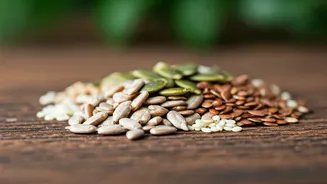Chia Seeds: A Boost
Chia seeds are tiny powerhouses of health, known for their ability to lower LDL (bad) cholesterol and increase HDL (good) cholesterol levels. Rich in omega-3
fatty acids, fiber, and antioxidants, chia seeds also help manage blood sugar levels, contributing to overall heart health. These seeds are incredibly versatile; they can be added to smoothies, sprinkled on yogurt or cereal, or used as a thickening agent in sauces. Furthermore, chia seeds support weight management by promoting satiety, which can indirectly aid in reducing cholesterol by helping you consume fewer calories. For optimal benefits, incorporate about 1-2 tablespoons of chia seeds into your daily diet. Consider soaking them in water for a few minutes before consumption to make them easier to digest and more effective in absorbing nutrients. Including chia seeds in your meals represents a simple yet impactful step towards improving heart health.
Flaxseeds: Cholesterol Control
Flaxseeds, another excellent choice for heart health, are packed with omega-3 fatty acids and soluble fiber. These components work together to lower LDL cholesterol, reduce inflammation, and improve overall cardiovascular function. The lignans present in flaxseeds possess antioxidant properties that further safeguard against heart disease. Consuming flaxseeds involves incorporating them into your daily diet through ground or whole forms. Ground flaxseeds are more easily digested and allow for maximum nutrient absorption; add them to your morning oatmeal, smoothies, or baked goods. A recommended daily intake is about 1-2 tablespoons. Be sure to store flaxseeds in an airtight container in the refrigerator to prevent them from becoming rancid. Regular use of flaxseeds has been associated with enhanced heart health, contributing to a reduced risk of heart-related ailments.
Hemp Seeds: Heart Wellness
Hemp seeds provide a complete protein profile and are rich in omega-3 and omega-6 fatty acids, along with important minerals such as magnesium and potassium, making them excellent for heart health. They can assist in lowering LDL cholesterol levels and improving the elasticity of blood vessels. Hemp seeds are easily incorporated into any meal. They have a mild, nutty flavor, which works well in various recipes. Sprinkle them on salads, add them to your morning cereal, or blend them into smoothies. A recommended serving size is about 1-3 tablespoons daily. Hemp seeds are a good source of fiber, which helps support digestive health and contributes to feeling full, aiding in weight management. Regular consumption of hemp seeds can contribute to a healthier cardiovascular system and a decreased likelihood of heart-related issues.
Pumpkin Seeds: Nutrient Power
Pumpkin seeds are a nutrient-dense snack loaded with phytosterols, compounds that help lower LDL cholesterol. They also offer magnesium, which is critical for regulating blood pressure, and healthy fats that support heart function. To introduce pumpkin seeds into your diet, try roasting them with a touch of seasoning for a satisfying and heart-friendly snack. Alternatively, add them to your salads, soups, or even baked goods. A daily serving of about a quarter cup of pumpkin seeds can be very beneficial. Their versatility makes them easy to incorporate into many recipes. The addition of pumpkin seeds to your diet can significantly contribute to better heart health by helping manage cholesterol levels and improving overall cardiovascular wellness. Consider them a great addition to your routine.
Sunflower Seeds: Antioxidant Boost
Sunflower seeds are packed with vitamin E, an antioxidant that helps protect against inflammation and supports heart health. They also contain phytosterols, which contribute to the reduction of LDL cholesterol levels. Include sunflower seeds in your diet as a snack or add them to your meals. A small handful is an easy snack. Incorporate them into salads, add them to trail mixes, or sprinkle them on top of yogurt or oatmeal. The healthy fats and fiber in sunflower seeds also play a crucial role in overall heart wellness by helping maintain healthy cholesterol levels. Consuming these seeds regularly aids in reducing the risk of heart disease and promoting a well-functioning cardiovascular system. They are a simple yet effective way to support your heart’s well-being.
Sesame Seeds: Heart Healthy Choice
Sesame seeds are a good source of lignans, which have been shown to help lower cholesterol levels, and contain essential nutrients such as copper and magnesium. These seeds also provide healthy fats and fiber, further contributing to heart health. To make sesame seeds part of your daily intake, consider adding them to various recipes. Sesame seeds can be sprinkled on salads, used in stir-fries, or added to baked goods. They have a distinctive flavor that enhances many dishes. A recommended serving size is about 1-2 tablespoons daily. Regular consumption of sesame seeds can significantly contribute to improved cholesterol levels and general heart health. Their inclusion in your daily diet offers a simple yet efficient approach to maintaining a healthy heart.













